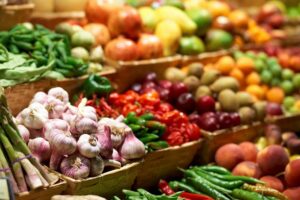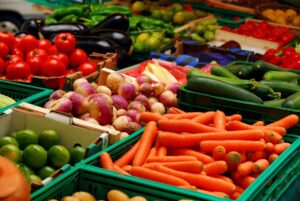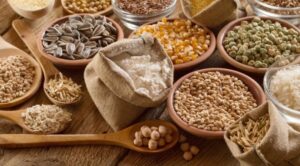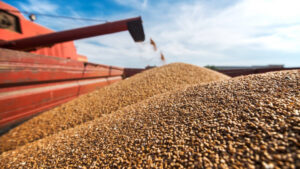
In 2023, Ukraine became the third largest supplier of agricultural products to the EU and increased its share of agricultural imports by 11% in January-September compared to 2022, the Polish publication farmer.pl reported, citing a report by the European Commission.
“Ukraine remains one of the three largest suppliers of agricultural products to the EU, according to the European Commission’s report on international trade. In the period from January to September this year, the European Union increased imports of agricultural products from Ukraine by 11% compared to 2022,” the publication wrote.
According to the report, the value of Ukrainian exports of agricultural products to the EU in the period from January to September 2023 reached EUR8.75 billion.
“Imports from Ukraine showed the largest increase in the period from January to September compared to 2022 (+891 million euros, or +11%), mainly due to an increase in grain imports,” the European Commission report says.
The biggest jump in these imports was recorded between January and June this year. Since June, imports have remained below the level of 2022, and in September they almost returned to the level of 2021, the EC said.
According to the results of the reporting period, Ukraine became the third largest exporter of agricultural products to the EU – after Brazil and the UK.
At the same time, Ukraine ranks 14th among the recipients of agricultural products from the European Union. From January to September of this year, Ukraine imported products from the EU for EUR 2.5 billion, which is 19% more than in the same period last year, farmer.pl noted.

In October 2023, Ukraine managed to export 4.8 million tons of agricultural products, up 15% from the same period of the previous month, the Ukrainian Agribusiness Club reported on Facebook.
According to the report, the increase in exports in October 2023 was achieved despite problems with routes through the Danube river ports – traditional seasonal shallow water, which prevents the entry of larger vessels, and a decrease in the load on barges.
“Part of the increase in exports was due to the addition of another export channel – the seaports of Odesa region, which are currently operating as part of a temporary sea corridor. However, the volume of exports through this channel is very far from pre-war levels,” the analysts stated.
According to their information, in October 2023, Ukraine exported 2.5 mln tonnes of grains, 52% of which were wheat and 45% were corn, which showed a 20% increase compared to the previous month. Oilseeds were exported to 914.0 thsd tonnes (rapeseed – 48%, soybeans – 48% and sunflower seeds – 3%), up 4%.
In addition, exports of vegetable oils increased by 6% to 508.7 thousand tons (sunflower oil – 80%, rapeseed oil – 14%, and soybean oil – 6%), and by 18% of cake – 491.5 thousand tons (sunflower oil – 86%, soybean oil – 14%).
Exports of corn and soybeans, which are currently being actively harvested, increased compared to the previous month.
“Although there has been an increase in exports, they remain insufficient to export the harvest that Ukraine has harvested this year. For the relatively normal functioning of the agricultural market, Ukraine needs to export about 6 million tons of food per month, preferably by sea, where logistics are less expensive,” the UCAB summarized.

Three bulk carriers with agricultural products and iron ore have left the ports of Chornomorsk and Pivdennyi, and five new vessels are heading to the ports for loading, said Deputy Prime Minister and Head of the Ministry of Reconstruction Oleksandr Kubrakov.
“Bulk carriers AZARA, YING HAO 01, ENEIDA (flags of Liberia and Palau) exported more than 127 thousand tons of Ukrainian agricultural products and iron ore,” he wrote on Facebook on Sunday.
According to the Deputy Prime Minister, 5 new vessels are being loaded at the ports of Greater Odesa: bulk carriers OLGA, IDA, DANNY BOY, FORZA DORIA, NEW LEGACY export almost 120 thousand tons of Ukrainian grain to Africa and Europe.

Agroprosperis agricultural group has supplied 17 thousand tons of agricultural products to Italy and Spain through the ports of Croatia since the beginning of 2023, the press service of the agricultural holding reported.
“In the first weeks of September of this year, Ukrainian and world media were abuzz with the news that Ukraine started exporting grain through the seaports of Croatia. “Agroprosperis is among the domestic exporters who were the first to use this route this year. It has become an important step in the expansion of Ukrainian agro-logistics against the background of the aggressor’s blockade of the grain corridor from the deep-water ports of the Black Sea,” the company’s website reported.
The agroholding noted that it was familiar with this export channel and had used it in previous years. During 2021-2022, the agroholding shipped 4,000 tons of GMO-free soybeans to Italy through Croatian ports for export. Since the beginning of the 2023-2024 marketing year, 6 thousand tons of corn were shipped to Italy and 11 thousand tons of wheat to Spain.
Currently, Agroprosperis is implementing a program of accumulation of wheat and soybeans for customers in Egypt and Europe.
According to the report, the structural subdivisions of the agroholding continue production of agricultural products and their export through alternative logistic routes. Agroprosperis noted the selfless work of its subdivisions in Sumy and Chernihiv regions, which grow, take care of crops and harvest crops under shelling.
In addition, the Agroprosperis Charitable Foundation is also active, providing direct assistance to 2,400 war victims totaling more than UAH 30 million.
Before the Russian military invasion, Agroprosperis had a land bank of 430 thousand hectares and total storage capacity of 800 thousand tons of crops. The holding grew and exported more than 2 million tons of grain and oilseeds per year.
“Agroprosperis operates through five divisions: Golden Sunrise (Agro), Bio Agro, Ray Agro, Latagro, New Agro Management, and provides financing to Ukrainian grain producers through Agroprosperis Bank.

Rumanian Prime Minister Marchel Ciolaku will ask the country’s agriculture and economy ministers to approve a joint resolution to extend the ban on imports of Ukrainian agricultural products for 30 days, RFI quoted the head of the Rumanian government as saying.
Ciolacu said that he expects a proposal from Ukrainian Prime Minister Denis Schmigal on the licensing of grain exports, which will be discussed.
He added that after the European Commission’s decision not to extend the ban on Ukrainian agricultural products, “not a single kilogram of wheat has been imported to Romania from Ukraine.”
“If there are requests for exports to Romania, I will definitely ask the Minister of Agrarian Policy and the Minister of Economy to adopt a joint order that for 30 days, until everything is clarified, the restrictions will be extended. I repeat: there are no requests, and I want to assure the agrarians that it will not be like a year ago,” assured Ciolacu.
As reported, the European Commission announced on September 15 that it would not extend restrictions on imports of agricultural products from Ukraine with some conditions to avoid a new grain surge.
On May 2, the EC imposed a temporary restriction on imports of Ukrainian agricultural products, in particular wheat, rapeseed, sunflower and corn, to five EU member states – Poland, Bulgaria, Hungary, Romania and Slovakia. Those argued that Ukrainian grain was hitting their market and hurting farmers. On June 5, the restrictive measures were prolonged until September 15.
After the restrictions on imports of Ukrainian agricultural products were lifted, Poland, Hungary and Slovakia introduced unilateral bans. Poland expanded the list of products banned for import by adding flour and cereals. Hungary brought the list to 25 items.